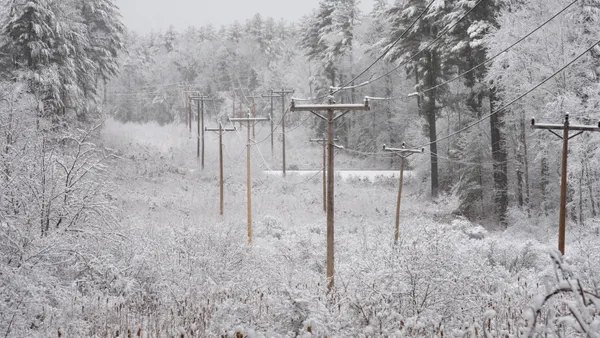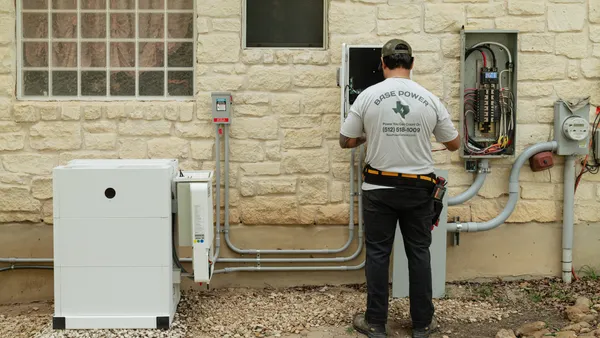Dive Brief:
- The U.S. Department of Energy (DOE) last week issued a notice of proposed rulemaking (NOPR) that efficiency advocates say will slow down the process of developing energy efficiency standards and potentially leave significant savings unrealized.
- DOE's Office of Energy Efficiency and Renewable Energy (EERE) is proposing changes to the "Process Rule" that the agency says would clarify its purpose and "revise language in certain provisions" to make it consistent with the Energy Policy and Conservation Act of 1975 (EPCA).
- Efficiency advocates say the changes propose an "arbitrary threshold" of energy savings that new or updated standards must meet, while other changes would make developing those standards more difficult.
Dive Insight:
There was a time when energy efficiency standards were widely seen as a bipartisan success, but now is not that time. On their face, the DOE's proposed changes appear benign and dull. The rule at issue is "Procedures, Interpretations, and Policies for Consideration of New or Revised Energy Conservation Standards for Consumer Products," which does not roll off the tongue.
But advocates say the changes to the process rule would make it significantly more difficult to develop standards, and a new threshold on energy savings would mean smaller improvements could be ignored.
The proposal "creates new hurdles to creating efficiency standards, and puts manufacturers in control of that practice," Andrew deLaski, executive director of the Appliance Standards Awareness Project, told Utility Dive.
According to deLaski, the changes would make it "very difficult to adopt anything different than the industry test procedures." That, he said, gives manufacturers "carte blanche to write the rules for how efficiency is measured. That's a clear conflict of interest."
This was a point that the North American Association of Food Equipment Manufacturers hit on in its comments to EERE last year, in response to a request for information from the agency, though it came to the opposite conclusion.
"DOE should use industry testing standards to the greatest extent it can," the group wrote. The group was pleased by the NOPR, saying in a press release last week that the proposal includes "substantial improvements."
But deLaski warned that the changes would also make negotiated standards significantly less likely, because they would eliminate the ability to adjust compliance dates and use multiple standards for a single product. "This kind of flexibility has been crucial for various negotiated agreements," he said.
What is 'significant' energy savings?
The proposed changes include the introduction of a threshold energy savings that must be achieved by new standards.
DOE says its proposal is based on an examination of all of the agency's previous standards rulemakings, and would set a threshold value, over a 30-year period, of 0.5 quad and a percentage threshold value of 10%.
According to the NOPR, the agency is "concerned with the direct economic impacts that are likely to flow from imposing standards that are projected to yield relatively lower energy savings — standards that may produce little in overall benefits in energy and cost savings for consumers when compared to the costs related to the manufacture and purchase of products and equipment meeting these kinds of standards."
The Natural Resources Defense Council says that logic misses a major point.
"While some standards save more than others, even the smaller savings add up," Lauren Urbanek, a senior energy policy advocate for NRDC, wrote in recent blog post.
According to Urbanek, had that limit been in place all along, the country would have missed out on 4 quadrillion British thermal units of energy savings. "Setting a savings threshold is completely contrary to the direction the country — and the world — need to go in to avoid the worst impacts of climate change," she wrote.
DOE: Court gave agency 'a degree of latitude'
Currently, DOE standards have focused on all but "genuinely trivial" energy savings. That was the language used by the U.S. District Court for the District of Columbia in 1985, in Natural Resources Defense Council v. Herrington, when the judiciary was asked to determine DOE's obligations under EPCA.
The EPCA says DOE's standards must "result in significant conservation of energy." In Herrington, the court concluded Congress did not intend for efficiency standards to ignore a "cost-free chance to save energy unless the amount of energy saved was genuinely trivial."
The agency has been using its discretion to set levels since Herrington, and advocates say the process works.
"Allowing DOE's professional staff to use data, analysis, and their good judgment has worked well for decades," Urbanek wrote.
But according to last week's NOPR, DOE said it has "tentatively concluded" that Herrington gives the agency "a degree of latitude with respect to determining whether a given level of energy savings constitutes 'significant' energy savings for purposes of satisfying the requirements under EPCA."
DOE says it will hold a public meeting March 21 to discuss the NOPR. And comments will be accepted through April 15.
According to Steve Nadel, executive director of the American Council for an Energy-Efficient Economy, DOE "seems determined to do this as quickly as possible." But, he told Utility Dive, "whatever they do is pretty likely to be challenged in court."













